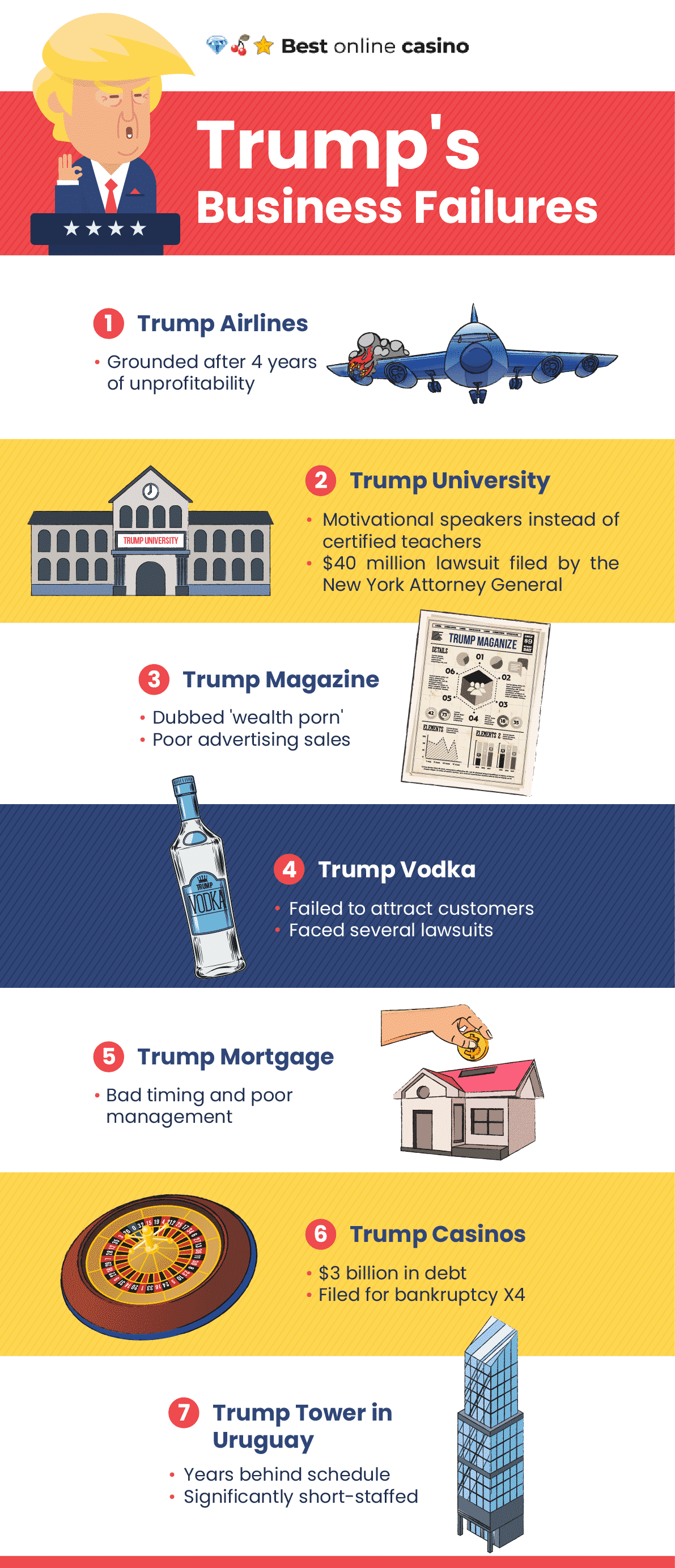With an economy barely holding up, Donald Trump remains calm and composed. But this unsurprisingly weak crisis handling is largely attributed to his poor stint in his past (and present) life.
Best Online Casino Sites in the Philippines for 2024
| # | Casino | Rating | Bonus | Bonus Code | |
|---|---|---|---|---|---|
| 1 |  | Read Review | First Deposit Bonus Up to ₱7000 + 120 Free Spins | Claim Bonus | |
| 2 |  | Read Review | 100% BONUS UP TO 18,000 PHP | Claim Bonus | |
| 3 |  | Read Review | Up to $20,000 Sign Up Reward | Claim Bonus | |
| 4 |  | Read Review | Welcome Package up to $500 or 5 BTC + 180 Free Spins | Claim Bonus | |
| 5 |  | Read Review | 150% Welcome Bonus Package up to ₱15,000 | Claim Bonus | |
| 6 |  | Read Review | Welcome Package up to €1500 + 150 FS | Claim Bonus | |
| 7 |  | Read Review | Welcome Package up to $1500 + 150 free Spins | Claim Bonus | |
| 8 | Read Review | Welcome Pack Up to €2500 + 250 Free Spins | Claim Bonus | ||
| 9 |  | Read Review | Up to 100$ on your first deposit. Registration required. | Claim Bonus | |
| 10 |  | Read Review | Welcome Bonus up to €1750 and 290 Free Spins | Claim Bonus |
As the presidential election inches closer and closer, we are reminded anew that the land of the free might hand down a second term to a floundering chief executive that has, in the last decades, floundered in the business industry as well.
The neoliberal gimmick of this made-for-TV politician has been memorialized in the media and pop culture as a classic example of the ultimate “American dream” story. His vast wealth has kickstarted this pursuit, huge thanks to his real-estate developer father who pushed the Trump name ahead of the pack.
But as we see a collapsing US economy amid the pandemic, we are reminded of his several misfires before entering politics. And most of them, sad to say, were business failures America surely would not want to forget.
Share the infographic, use the following code:
Trump Airlines
In 1988, Trump bought a small shuttle service ran by Eastern Air Shuttle for 27 years and sought to transform it into a luxury experience by slapping some gold bathroom fixtures, among other extravagance. However, consumers weren’t bewitched at all. The commuter planes, which ran hourly flights between Boston, Massachusetts, New York and Washington D.C., were grounded some four years later after the business lost money and was crippled by a high debt load. Trump ultimately surrendered ownership of the service to his creditors.
Trump University
Trump ventured into profiteering on education through the launch of the Trump University, also known as the Trump Entrepreneur Initiative. It established wealth-building seminars aimed at students hoping to learn the secret to success in business, with fees ranging from $1,500 to as high as $35,000. But instead of hand-picked teachers the mogul committed to hire, the lessons were delivered by motivational speakers, some of whom didn’t even earn degrees. The school then faced lawsuits from students, which led to its closure in 2010. A separate $40 million lawsuit over fraud chargers was filed three years later by the New York Attorney General.
Trump Magazine
Aimed at tapping into a “rich cultural tapestry,” Trump reinvented his self-promoting magazines Trump Style and Trump World, both used to promote his other projects. His former creative director, who called the magazines “wealth porn,” said that they sought to cash in on the burgeoning advertising market for high-end commodities. But his so-called affluent readers didn’t bat an eye, resulting in insufficient subscriptions and pushing the business to sink during the financial crisis in 2009.
Trump Vodka
Bannered with a promising slogan – “success distilled” – Trump launched his vodka line in 2006. While it counted on the legacy and brand of Trump himself, it was this same reputation that failed to gain customers’ confidence. The liquor company was shown the door out of the cutthroat industry as it folded in 2011.
Trump Mortgage
In 2006, Trump thought putting up a mortgage company would further push the envelope in his flourishing real-estate market career. And so he exclaimed, “Who knows more about financing than me?” – a piercing writing on the wall when he designated E.J. Ridings as chief executive of the company. But the market was badly deteriorating at that time, and it was about to falter in a few months. Trump Mortgage went to the wall, doing less than a third of the $3 billion executives hoped it would in its first year of operation. While Trump blamed the failure on his business partners, it was later reported that Ridings lacked leadership skills, a stark contrast to his claim as “top executive of one of Wall Street’s most prestigious investment banks.” Trump Mortgage closed doors in September 2007.
Trump Casinos
Dubbed as the biggest gaffe of Trump’s business ventures, the self-proclaimed mogul filed for bankruptcy on his casinos in Atlantic City, owned by Trump Entertainment Resorts.
Trump filed for bankruptcy for the Trump Taj Mahal in 1991, which was $3 billion in debt during its infancy. In 2004, his properties were far from salvaging after the Trump Marina and Trump Plaza casinos also faced bankruptcy, alongside a riverboat casino in Indiana that incurred a debt of close to $2 billion. The business entity then filed for bankruptcy for the fourth time. The local economy was on the brink of collapse due to loss of employment, defaulted loans and elimination of tax revenue. Trump eventually stepped down as chairman.
Trump’s declining net worth
Just as Trump tries to bury the lede of these failed business ventures, Bloomberg, in August this year, reported a decline of $300 million in the chief executive’s net worth, bringing it down to $2.7 billion. Bloomberg Billionaires Index said this “erased 10 percent of his fortune since he took office.”
While the world’s top economy continues to grapple with the pandemic, Bloomberg noted that the biggest blows to Trump’s net worth included declines in the value of Trump’s office building at 40 Wall Street, properties owned jointly with Vornado Realty Trust, and the iconic Trump Tower on Fifth Avenue. The Trump Organization was certainly not spared by the ravaging pandemic.
Trump’s project in Uruguay
Speaking of the Trump Organization, the Trump Tower project at Punta del Este in Uruguay has stalled and is now years behind schedule. The New York Times reported that Trump’s high hopes for a Uruguayan condominium development would have to wait until 2020 after cash shortages and mismanagement grounded its construction to a halt.
But with the coronavirus pandemic sweeping the globe, would the public see the skyscraper by the end of this year? A construction workers’ union leader said the project might even take until 2024 to finish.
As of 2019, the tower reportedly had issues with funding, and less than a fourth of the workers needed to build the tower were working on it.
Trump Tower in the Philippines: an ethical dilemma?
With Trump still getting his hands on business amid his arduous task at the White House, legal and ethical experts have expressed concern about the supposed overlap between the Trump family’s private business interests and their roles as public figures and policy implementers.
In 2017, the Washington Post wrote regarding the erection of the Trump Tower Manila in the Philippines that Trump “can never truly separate himself from his brand.” The Trump Organization opened a 57-story skyscraper in Manila, the Philippines’ capital, calling it the nation’s “most amenitized residential high-rise and Manila’s definitive landmark.”
Trump, the Washington post reported, was in a message filmed years before he was elected American president, saying the skyscraper bearing his name near the Philippine capital would be “something very, very special, like nobody’s seen before.” Indeed, a marriage between business and politics.



